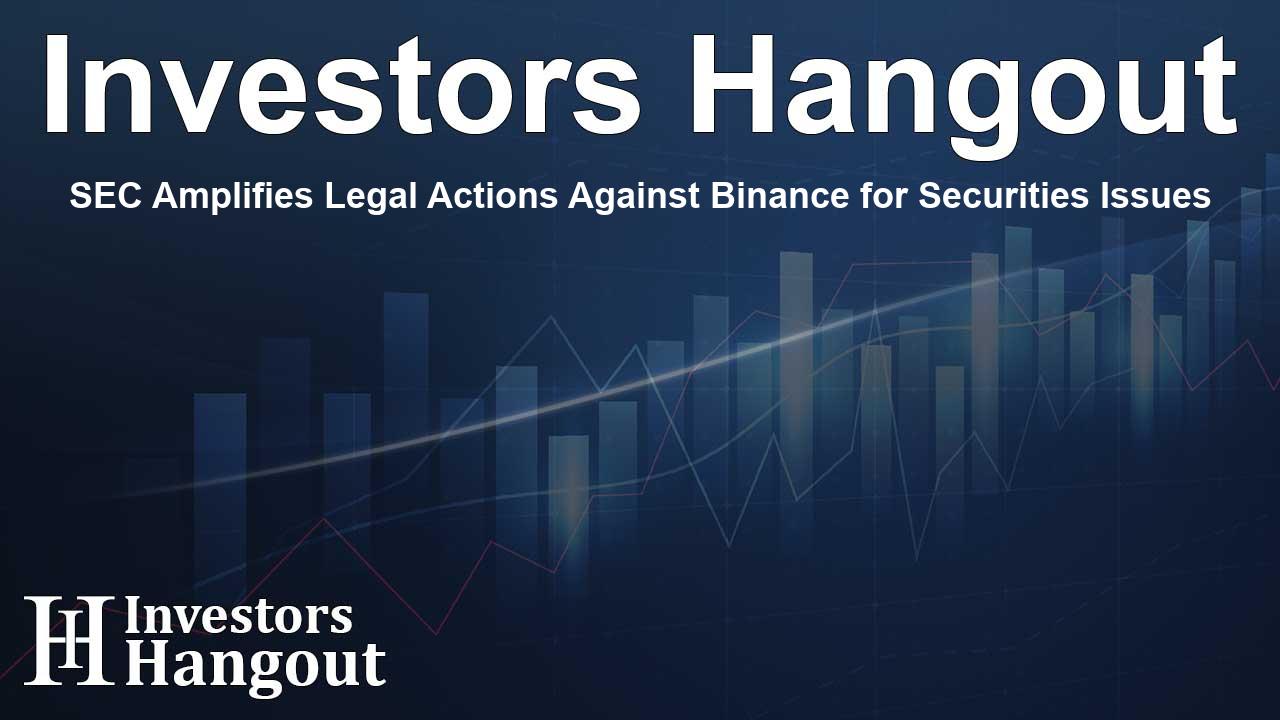SEC Amplifies Legal Actions Against Binance for Securities Issues

The SEC's Legal Actions Against Binance
The U.S. Securities and Exchange Commission (SEC) is intensifying its scrutiny of Binance, one of the world's leading crypto exchanges. The agency is working to enhance the original lawsuit against the exchange, focusing on further substantiating allegations around the sale of unregistered securities.
Overview of the Case
Recently, the SEC filed an amended complaint, aiming to address issues highlighted by a judge earlier. This new filing seeks to provide greater clarity on how Binance allegedly sold unregistered securities, particularly through its proprietary tokens BNB and BUSD. The SEC's ongoing investigation follows an initial lawsuit initiated in mid-2023.
Background of the Lawsuit
In June 2023, the SEC accused Binance of operating without the necessary broker or clearinghouse registrations, asserting that it offered unregistered securities. A significant part of these claims involved Binance’s native tokens, particularly BNB and BUSD, which the SEC states were marketed to investors without appropriate oversight.
Recent Developments
The legal saga has seen some developments, with a partial dismissal of certain charges against Binance in mid-2024. Judge Amy Berman Jackson determined that certain allegations related to Binance's Simple Earn program and secondary sales of BNB lacked sufficient support. Despite this setback, the SEC is pressing forward to amend its complaint, directly addressing the judge's previous concerns while expanding its allegations.
Promotion of Unregistered Cryptocurrencies
Notably, the SEC's amended complaint indicates that Binance may have aggressively promoted various cryptocurrencies, labeling them as unregistered securities. Among these cryptocurrencies are well-known assets like Solana (SOL) and Cardano (ADA). The SEC claims these promotions were misleading and concerned with the legality of the token sales.
The Role of Binance
The SEC's filing contends that Binance played a pivotal role in driving the success of these digital assets. It alleges that BNB was marketed not only as a utility token for the exchange but as part of an investment strategy that could potentially yield significant returns for investors.
Binance's Position
As Binance is likely to counter the SEC's motions, the agency maintains that the exchange has long been aware of these allegations. The SEC asserts that the modifications to the complaint will not introduce new claims that could unjustly overwhelm the defendants. Instead, the focus will remain on existing issues surrounding the marketing and sale of these digital assets.
Future Implications for Crypto Regulation
This ongoing legal battle is critical as it could set precedents for how cryptocurrencies are treated under U.S. securities law. Regulatory scrutiny is intensifying across the crypto space, with many industry figures anxiously observing how the SEC's actions may influence broader regulatory measures.
Risks Associated with Binance's Services
The SEC's recent efforts also highlight potential risks related to services like Binance’s Simple Earn and other digital assets including MATIC and AXS. The agency implies that Binance's marketing strategies potentially encouraged unwarranted investments by obscuring the complexities and risks involved.
Clarity on Legal Terminology
In the recent filings, the SEC sought to clarify its previous terminology, especially around the concept of 'crypto asset securities.' The agency has emphasized that its argument is not necessarily about declaring the assets as securities themselves, but rather regarding how they were sold in conjunction with unregistered investment contracts.
The Path Ahead
As both parties prepare for upcoming court dates, the implications of this case will remain significant not just for Binance, but also for the cryptocurrency industry at large. The regulatory landscape for digital assets is in flux, making this ongoing lawsuit one of the most critical moments in recent crypto history.
Frequently Asked Questions
What are the main allegations against Binance?
The SEC alleges that Binance sold unregistered securities through its tokens BNB and BUSD and has showcased how products like Simple Earn lacked proper registrations.
How has Binance responded to the SEC's claims?
Binance is expected to contest the SEC’s motions, asserting they have been aware of the allegations since the initial lawsuit was filed.
What is the importance of the SEC's amended complaint?
The amended complaint aims to directly address the judge's concerns regarding the initial case and bolster claims against Binance's alleged securities violations.
Which cryptocurrencies are at the center of this legal issue?
Key cryptocurrencies involved include BNB, BUSD, SOL, ADA, MATIC, and AXS, which the SEC believes were promoted as unregistered securities.
What does this lawsuit mean for the future of crypto regulations?
The outcome could impact regulatory approaches to cryptocurrencies and how digital assets are perceived under U.S. securities law, making it a crucial case for the industry.
About Investors Hangout
Investors Hangout is a leading online stock forum for financial discussion and learning, offering a wide range of free tools and resources. It draws in traders of all levels, who exchange market knowledge, investigate trading tactics, and keep an eye on industry developments in real time. Featuring financial articles, stock message boards, quotes, charts, company profiles, and live news updates. Through cooperative learning and a wealth of informational resources, it helps users from novices creating their first portfolios to experts honing their techniques. Join Investors Hangout today: https://investorshangout.com/
Disclaimer: The content of this article is solely for general informational purposes only; it does not represent legal, financial, or investment advice. Investors Hangout does not offer financial advice; the author is not a licensed financial advisor. Consult a qualified advisor before making any financial or investment decisions based on this article. The author's interpretation of publicly available data shapes the opinions presented here; as a result, they should not be taken as advice to purchase, sell, or hold any securities mentioned or any other investments. The author does not guarantee the accuracy, completeness, or timeliness of any material, providing it "as is." Information and market conditions may change; past performance is not indicative of future outcomes. If any of the material offered here is inaccurate, please contact us for corrections.